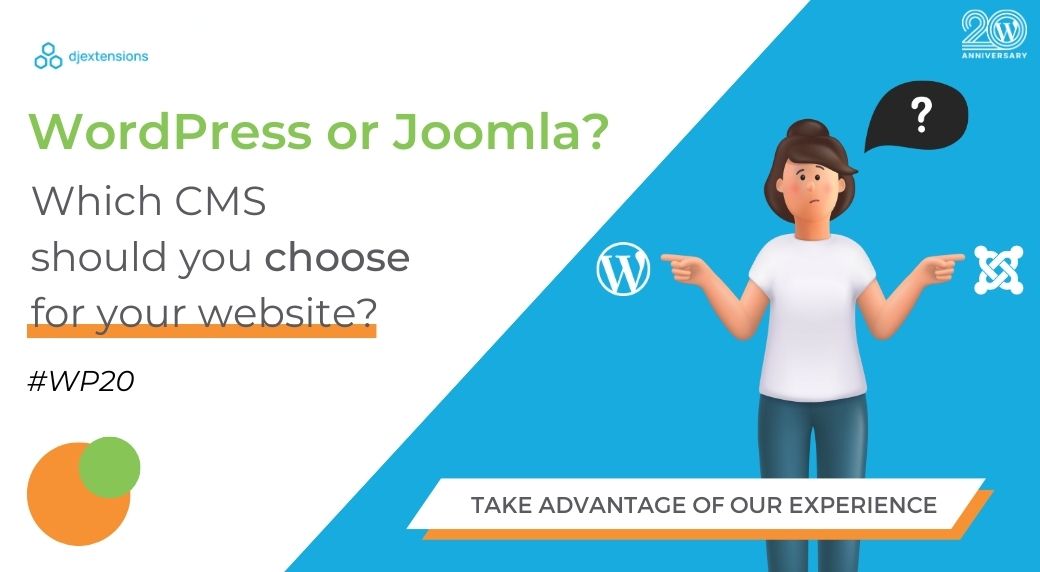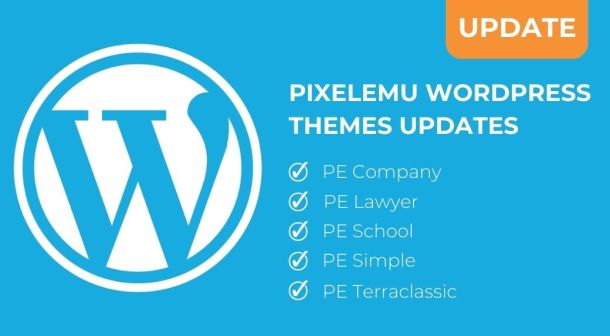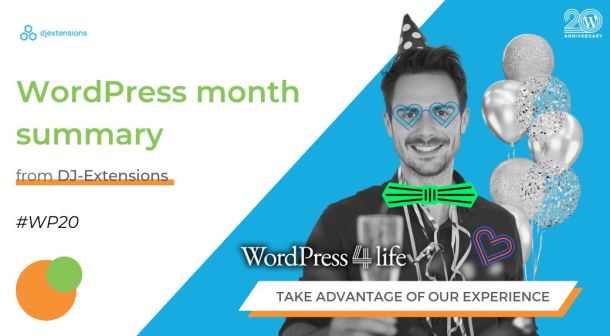
WordPress or Joomla? Which CMS should you choose for your website?
Choosing the right content management system (CMS) is an important decision for anyone who wants to create a website. With so many different CMS platforms available, it can be difficult to know which one is the best fit for your needs. In this blog post, we will compare two of the most popular CMS platforms: WordPress and Joomla.
Both are powerful platforms that offer a range of features and customization options. However, they have different strengths and weaknesses, and the choice between the two ultimately depends on the needs and preferences of the user.
By understanding the key features, ease of use, customization options, security, support, and cost of each platform, you can make an informed decision about which CMS to choose for your website. Choosing the right CMS can help ensure that your website is powerful, flexible, and tailored to your specific needs, which can ultimately help you achieve your online goals.
What are WordPress and Joomla?
WordPress and Joomla are complex solutions for building and managing websites. Both are free and open-source, meaning that anyone can use, modify, and distribute the software for their own purposes.
WordPress was first launched in 2003 as a blogging platform, but has since evolved into a powerful CMS that can be used to create any type of website. It is written in PHP and uses a MySQL database to store content. WordPress is known for its user-friendly interface, customizable themes and plugins, and extensive community support.
Joomla, on the other hand, was first released in 2005 and is also written in PHP. It is known for its advanced functionality, including features such as user management, multi-language support, and e-commerce capabilities. Joomla is also highly customizable and extensible, with a large library of templates and extensions available for download.
WordPress and Joomla differ in their approach to website creation and management. WordPress is generally considered to be more beginner-friendly and easier to use, while Joomla is often preferred by more experienced developers who require more advanced functionality and customization options.
Most important WordPress features
WordPress offers a wide range of features that make it a popular choice for bloggers, small business owners, and even large corporations.
Here are some of the key features of WordPress:
- Ease of Use: WordPress is known for its user-friendly interface and ease of use. Even those with little to no technical experience can quickly learn how to use WordPress to create and manage their website.
- Flexibility: WordPress is highly flexible and can be used to create any type of website, from blogs and portfolios to e-commerce sites and social networks.
- Customization: WordPress offers a wide range of customizable themes and plugins that allow users to create unique and personalized websites without having to write any code.
- Popularity: WordPress is the most popular CMS platform in the world, powering more than 40% of all websites on the internet.
- SEO-Friendly: WordPress is designed with search engine optimization (SEO) in mind, making it easy to optimize your website for search engines and improve your online visibility.
- Mobile-Friendly: WordPress offers a range of responsive themes that ensure your website looks great on any device, from desktops to mobile phones.
- Community Support: WordPress has a large and active community of users and developers who contribute to the platform's ongoing development and offer support and advice to fellow users.
Overall, WordPress is a versatile and user-friendly CMS platform that offers a wide range of features and benefits to website owners of all levels of experience.
Most important Joomla features
Joomla offers a range of advanced features that make it a preferred choice for more experienced developers who require greater functionality and customization options.
Here are some of the key features of Joomla:
- Advanced functionality: Joomla is known for its advanced functionality, including features such as user management, access control, and multilingual support.
- Extensibility: Joomla offers a wide range of extensions and plugins that allow users to add new features and functionality to their website, such as e-commerce capabilities and social networking tools.
- User Management: Joomla offers advanced user management features, making it easy to manage multiple users with different permissions and access levels.
- Customization: Joomla offers a wide range of templates and themes that can be customized to create unique and personalized websites.
- Security: Joomla has a strong focus on security, with built-in security measures and a community-driven approach to identifying and addressing potential security vulnerabilities.
- Multilingual Support: Joomla is designed with multilingual support in mind, making it easy to create websites in multiple languages.
- Community Support: Joomla has a large and active community of users and developers who contribute to the platform's ongoing development and offer support and advice to fellow users.
Overall, Joomla is a powerful and flexible CMS platform that offers a range of advanced features and benefits to website owners who require greater functionality and customization options. While it may have a steeper learning curve than other CMS platforms, such as WordPress, it offers a range of benefits to experienced developers and businesses that require greater control and flexibility over their websites.
Ease of Use
One of the key factors to consider when choosing a content management system (CMS) platform is ease of use. A user-friendly interface and intuitive design can help save time and reduce frustration when building and managing a website. Here's how WordPress and Joomla stack up in terms of ease of use:
- WordPress
WordPress is known for its user-friendly interface and ease of use, even for beginners. The platform has a straightforward dashboard with easy-to-understand menus and options, making it simple to create and manage content, add new pages and posts, and customize your website. WordPress also offers a visual editor that allows users to create and edit content without having to write any code. Additionally, the platform has a large and active community of users who offer support and advice to fellow users, making it easy to find answers to any questions or issues you may encounter.
- Joomla
Joomla has a steeper learning curve than WordPress and may not be as intuitive for beginners. The platform has a more complex interface with a greater number of options and menus, which can be overwhelming for new users. However, once you become familiar with the platform, Joomla offers a range of advanced features and customization options that can provide greater control and flexibility over your website. Joomla also has a large and active community of users who offer support and advice to fellow users, making it easy to find answers to any questions or issues you may encounter.
Overall, while both WordPress and Joomla offer a range of features and benefits, WordPress is generally considered to be more user-friendly and easier to use, especially for beginners. However, if you require greater functionality and customization options, Joomla may be a better choice, despite its steeper learning curve.
Customization and Design Options
Customization and design options are important factors to consider when choosing a content management system (CMS) platform for your website. Both WordPress and Joomla offer a range of customization and design options, but there are some differences between the two platforms.
- WordPress
WordPress offers a wide range of customizable themes and templates that allow users to create unique and personalized websites without having to write any code. There are thousands of free and paid themes available, offering a range of design options to suit different needs and preferences. Additionally, WordPress offers a range of plugins that allow users to add new features and functionality to their website, such as e-commerce capabilities and social networking tools.
- Joomla
Joomla also offers a wide range of customizable templates and themes, although there are fewer options than with WordPress. However, Joomla's templates are generally considered to be more flexible and customizable than WordPress's, allowing users to create more complex and sophisticated designs. Additionally, Joomla offers a range of extensions and plugins that allow users to add new features and functionality to their website, such as e-commerce capabilities and social networking tools.
Overall, both WordPress and Joomla offer a range of customization and design options, although there are some differences between the two platforms. If you're looking for a wider range of design options and customizable templates, WordPress may be the better choice. However, if you require greater flexibility and customization options, Joomla may be the better choice.
Security
Security is a crucial factor to consider when choosing a content management system (CMS) platform for your website. Both WordPress and Joomla offer a range of built-in security features and plugins to help protect your website from potential threats. Here's how the two platforms compare when it comes to security:
- WordPress
WordPress is a popular target for hackers, due to its widespread use and popularity. However, the platform takes security very seriously and offers a range of built-in security features, such as password encryption and user role management. Additionally, there are a range of security plugins available for WordPress that can help protect your website from potential threats, such as malware and hacking attempts. It's important to note that the security of a WordPress website largely depends on the actions of the website owner, such as choosing secure passwords and keeping the platform and plugins up to date.
- Joomla
Joomla also takes security seriously and offers a range of built-in security features, such as two-factor authentication and brute force protection. Additionally, there are a range of security plugins available for Joomla that can help protect your website from potential threats, such as malware and hacking attempts. Joomla also has a community-driven approach to identifying and addressing potential security vulnerabilities, with a dedicated team of volunteers focused on maintaining the platform's security.
Overall, both WordPress and Joomla offer a range of built-in security features and plugins to help protect your website from potential threats. However, due to its popularity, WordPress may be more vulnerable to hacking attempts, making it important for website owners to take extra precautions to keep their website secure. Joomla, on the other hand, has a strong focus on security and a community-driven approach to identifying and addressing potential vulnerabilities, making it a strong choice for businesses and individuals who prioritize security.
Support and Community
Support and community are important factors to consider when choosing a content management system (CMS) platform for your website. Both WordPress and Joomla have strong communities of users who offer support and advice, but there are some differences between the two platforms.
- WordPress
WordPress has a large and active community of users who offer support and advice to fellow users through forums, blogs, and other online resources. Additionally, there are a range of official and third-party support options available for WordPress, such as documentation, user guides, and tutorials. WordPress also has a large ecosystem of developers who create plugins and themes, which can provide additional support and customization options for users.
- Joomla
Joomla also has a large and active community of users who offer support and advice through forums, blogs, and other online resources. Additionally, there are official and third-party support options available for Joomla, such as documentation, user guides, and tutorials. Joomla also has a range of certified developers and designers who provide professional support and customization services.
Overall, both WordPress and Joomla have strong communities of users who offer support and advice, as well as a range of official and third-party support options available. However, WordPress may have a slight edge in terms of the size and diversity of its community, as well as the range of plugins and themes available. Joomla, on the other hand, may be a better choice if you require professional support and customization services.
Cost
Cost is an important factor to consider when choosing a content management system (CMS) platform for your website. Both WordPress and Joomla are open-source platforms, which means that they are free to use and can be downloaded and installed by anyone. However, there are still some costs associated with using these platforms.
- WordPress
WordPress itself is free to use, but there are still some costs associated with using the platform. For example, if you want to use a premium theme or plugin, you may need to pay for it. Additionally, you will need to pay for web hosting, which can range in price depending on the size and complexity of your website. However, there are many affordable web hosting options available, and the cost of using WordPress can be kept relatively low.
- Joomla
Joomla is also free to use, but there are still some costs associated with using the platform. For example, if you want to use a premium template or extension, you may need to pay for it. Additionally, you will need to pay for web hosting, which can range in price depending on the size and complexity of your website. However, like with WordPress, there are many affordable web hosting options available, and the cost of using Joomla can be kept relatively low.
Both platforms are free to use, but there may still be some costs associated with using these platforms, such as the cost of web hosting and premium templates or plugins. However, the cost of using these platforms can be kept relatively low, making them accessible options for individuals and businesses on a budget.
Conclusion
The choice between Joomla and WordPress depends on the needs and preferences of the user.
If ease of use and a large community of users and developers are important to you, WordPress may be the better choice. WordPress is also a good choice if you want to customize your website with a large number of plugins and themes.
On the other hand, if you prioritize flexibility and advanced functionality, Joomla may be the better choice. Joomla is also a good choice if you require professional support and customization services.
Of course, mentioned solutiones are excellent choices for creating a website. The key is to carefully consider your needs and preferences, and to choose the CMS that best fits those requirements. By doing so, you can create a website that is powerful, flexible, and tailored to your specific needs.


